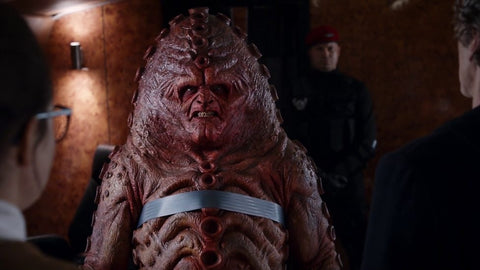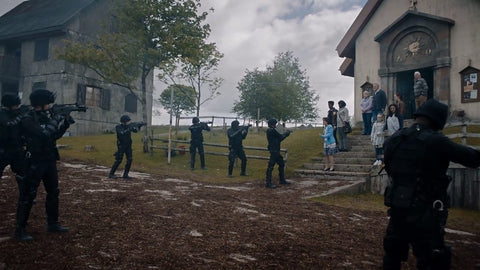
Once upon a time, there were three Doctors, two Osgoods, and one peace treaty.
The Day of the Doctor seems so long ago now, the show tonally changed, but I'm definitely behind the school of thought that Doctor Who should link to the past, building on that continuity, without leaning too heavily on its history. Series 9 has done this well with nods and allusions to Harold Saxon, Destiny of the Daleks, Journey's End, and Kill the Moon. The Zygon Invasion is the only one so far, however, that directly follows on from a past story.
That might sound a brave move, but the 50th anniversary special was watched by 12.8 million in the UK alone (not including cinema screenings or iPlayer) and this was a dangling plot-thread that needed to be cleared up. It's fair to say the majority who saw The Zygon Invasion recalled the events of The Day of the Doctor.
But was it a wise move? It's an interesting step, almost asking for comparisons between a blockbuster event and this two-parter, nestled near the middle of Series 9.
Just like Day, it changes the pace of the show quite considerably, moulding it into something slightly more akin to Spooks (or MI5 in America) at times – with lashings of Invasion of the Bodysnatchers.
As a 'sort of' sequel to The Day of the Doctor, Death in Heaven, and even Terror of the Zygons, with political ideals, morality questions, UNIT, and the task of bringing back Osgood (Ingrid Oliver) in a justified way, this episode had a long checklist, and as such, it ends up being a real mixed bag.

Its sombre tone is a good extension of the last episode; fortunately, a lot more happens to keep us interested. Nonetheless, there's something missing. The Zygon Invasion doesn't instantly grab you and refuse to let go. Previous serials like The Caves of Androzani, The Waters of Mars, and The Impossible Astronaut/ Day of the Moon manage to remain brooding but are still fast-paced and engaging. They have a drive and excitement about them that this week's offering simply doesn't.
The story is certainly an interesting one, though. Anyone could be a traitor; anyone could turn out to be someone else. There's suspicion in the air, and indeed, someone everybody trusts turns out to be a Zygon. It was quite obvious, especially after Clara, a responsible teacher, leaves a vulnerable child in a decidedly dodgy situation – not to mention her glee at supposedly despatching Zygons in the underground tunnel.
It doesn't matter: Jenna Coleman is utterly brilliant here. Her reveal is perfectly handled. It looks as if next week's episode will focus largely on Clara/Bonnie, and after her barely being in The Woman Who Lived (and considering she's leaving sometime during this run), this is more than welcome.
In fact, I'm really pleased we get to see an evil take on the character!

Knowing UNIT has been almost completely eliminated is shocking, but this UNIT is far removed from the force we saw in serials like The Daemons, Battlefield, or even The Power of Three. Still, it was surprisingly horrible to know Jac (Jaye Griffiths) had been killed, and so horribly too. After briefly appearing in The Magician's Apprentice, she wasn't afforded great dialogue – "pardon my sci-fi, but this is beyond any human technology" is not a line any member of UNIT should be using – so it's testament to Griffith's performance that she comes across as a warm and smart person.
The most stand-out element of The Zygon Invasion was its direction and location work. This is a stunning-looking story, unlike anything we've seen; the nearest comparison would be the Eleventh Doctor tales set in America, including A Town Called Mercy. The colours and light are stark and rich, the environs immediately beautiful. I'd be more than happy to see Daniel Nettheim return to the show on a regular basis.
So if the plot isn't to blame for its less-than-captivating feeling, it might be the failing of characterisation and individual narrative strands. Frankly, there were too many dumb things crowding an otherwise smart tale. Several things just didn't ring true.
Kate Stewart (Jemma Redgrave) is remarkably slow when confronted with supposedly the only person to survive a Zygon attack on the city of Truth or Consequences. (My money's on her shooting the alien with the gun she had tucked away in her jacket, and impersonating the Zygon.) Similarly, why did the head of UNIT not have any back-up with her at all?
Probably the dumbest scene is at the church in Turmezistan: you can maybe believe one officer falling victim to the pleas of an alien pretending to be his mum... but all of them? Not one soldier kept their wits about them; not one decided not to shoot but nonetheless keep their distance. It's very unlikely.

The attack on the village using the drone was far more realistic. One person's inability to carry out a strike on people who have taken the faces of loved ones is entirely believable.
Elsewhere, however, this was a very clever story, paralleling real-world events and forcing us to confront topics that are permanently in the news. It brings us back to the meaning of the words 'alien' and 'invaders'. The Doctor aptly notes, "This is a splinter group. The rest of the Zygons - the vast majority - they want to live in peace."
The opening gambit from the two Osgoods also hits home the message straight away. Sure, it's a little on-the-nose, but sometimes, we need that. It remains a grey area, with plenty to talk about, and that's what Doctor Who is about a lot of the time – the Third Doctor era most notably!
The message does tend to get in the way, sadly. Its moody tone doesn't really let up: that's fine, except the Twelfth Doctor here is written as if he's in the same mindset as during Series 8. But he's not that man anymore. I've praised the fact that Capaldi's Time Lord has had an extra injection of humour this series, but that's absent throughout The Zygon Invasion (bar one or two lines). Even the scene with the Doctor in the playground lacks anything to raise a smile.
This is such a massive shame because Peter commands better than that.

And despite his admittedly blood-soaked hands, the Doctor's care-free "try to kill as few of them as possible; I need to have someone to negotiate with" isn't right at all.
If this all sounds very negative – unfairly so, in fact - it's because the story stumbles under the weight of expectations. The pace isn't break-neck, so it's not engaging enough, despite conveying intriguing notions that really should capture the audience. Although it's been billed as such, it's simply not a thriller. Tonally, too, this isn't a sequel to The Day of the Doctor. It stands as an entirely separate entity, and with expectations altered, and the plot set up, I have every hope that next week's The Zygon Inversion will excel.













